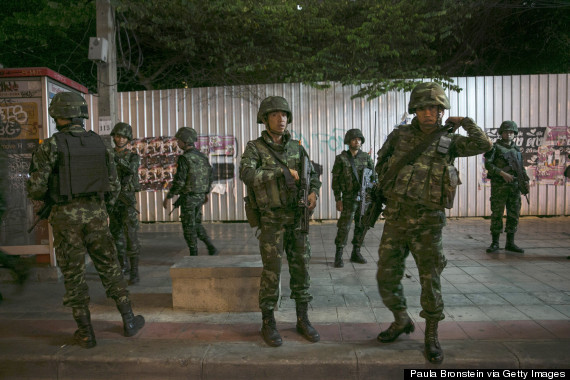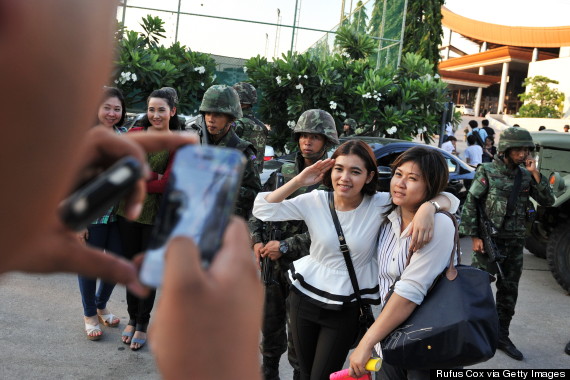
When Thailand's military announced a full takeover of the government on Thursday, many were quick to note that this was nothing new for the "Land of Coups." The nation holds the unfortunate distinction of having had more attempted coups in the past century than almost any other country in the world, 19 in total. Coups so dominate Thailand's politics that there is even a season nicknamed after them.
Thailand's number of military takeovers is quite an anomaly when it comes to international politics, and obviously not the optimal way one would like a country to run. Why then, does Thailand have such a predilection for coups? Here are a few factors that contribute to the constant turmoil:
A Scary Precedent Set In The Thirties
In 1932, a small group of military officers overthrew Thailand's ruling monarchy in an armed, but bloodless coup. As the Washington Post notes, the move ended almost 700 years of royal rule and established a constitutional monarchy that is still in place today.
While Thailand's military ceded power to a civilian government following the coup, the arrangement didn't last long. A year after the 1932 Siamese Revolution, the military once again stepped in to overthrow the government after the contentious rule of Prime Minister Phraya Manopakorn Nititada. This led to some stability of sorts (until the army coup'd again in 1942) but it also set a scary precedent that the military could step in at any time to take control of the country.
Coup-ing The Country's Problems Away
As Max Fisher explains over at Vox, some Thailand scholars argue that the initial swath of coups has led to a "coup culture" where it is deemed acceptable for the military to overthrow the government. This perhaps partially explains why the public reaction to Thursday's overthrow has been fairly muted, except for the odd extended happy hour.
In short, Fisher cites the work of Southeast Asia scholars to posit that "coups have become so normal that Thailand's political institutions, as well as its regular voters, have not felt compelled to find another way to resolve political conflict." If one agrees that societal norms play a significant role in formulating politics, then this is a compelling reason behind the history of Thai coups, but it also shouldn't be regarded as the sole impetus.
 Thai soldiers stand guard after a curfew started at 10pm on May 22, 2014 in Bangkok, Thailand.
Thai soldiers stand guard after a curfew started at 10pm on May 22, 2014 in Bangkok, Thailand.
Thailand Has A Lot Of Indicators For A Coup
Political scientist Jay Ulfelder, an expert in failed states, wrote on his blog Thursday that he is "surprised, but not shocked" at the recent turn of events in Thailand. In his yearly survey of the countries he deems most susceptible to coups, Ulfelder placed Thailand in the top 10.
Ulfelder's reasoning was based on a number of complex variables and data sets, including elements such as geographic region, political stability and economic growth.
After this simulation, Ulfelder later stated on his blog that given the factors, he believed "the military will only seize power again if the situation degenerates enough to make the costs of inaction even worse—say, into sustained fighting between rival factions."
That's more or less exactly what happened, and as he states in his latest post, he believes "the growing concerns about an impending civil war and economic recession were finally enough to tip military leaders’ thinking in favor of action."
But Why Is There More Coup Attempts Than Anywhere Else?
It is indeed slightly bizarre that Thailand happens to have so many coups, even given its alleged coup culture and indicators. Ulfelder stated in a 2013 interview with the Washington Post on this very subject that he didn't see "anything in the historical data on risk factors that makes Thailand stick out as much as its coup-prone history suggests it should."
One possible reason is that in the history of Thailand's coups the government has always eventually ceded control over the nation back to a civilian government, unlike in countries like Egypt where coups have historically been followed by the lengthy rule of a military figurehead. When these civilian leaders fail to quell unrest in the nation, the military has repeatedly stepped in to crack down on freedoms and avenues of dissent, as well as oust the government leadership.
As NPR notes, throughout these coups the king has acted as a stabilizing force. His decades-long presence allows for a sense of continuity and stability even while the army ousts the elected government.
Another explanation is that coups breed more coups, and yet another that political divisions, government structure and economic factors are to blame. The likeliest is some combination of all these factors, and many more.
 Press pose for a portrait with Thai army soldiers standing guard at the grounds of the venue for peace talks between pro- and anti-government groups on May 22, 2014 in Bangkok, Thailand.
Press pose for a portrait with Thai army soldiers standing guard at the grounds of the venue for peace talks between pro- and anti-government groups on May 22, 2014 in Bangkok, Thailand.
What's Next
As the situation in Thailand progresses, it remains to be seen what will the future holds for the country's government. There are many excellent pieces of analysis from Thailand-watchers as to what may happen next, as well as if the Coup-prone nation can ever find true stability.For the time being however, it seems that many people in Thailand have once again resigned themselves to accept the latest overthrow, obey martial law, and grab a selfie for posterity on the way home.
